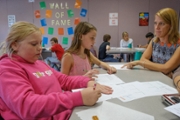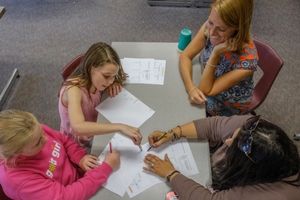Reframe Podcast: Episode 20

Miami-Talawanda Math Club Puts the “Fun” in Fundamentals

In this episode, we get a look inside an after-school tutoring program that brings together local middle school, struggling 6th graders, their teachers, and college students studying to become teachers, while also actually managing to benefit everyone involved.
James Loy:
This is Reframe, The podcast from the College of Education, Health and Society on the campus of Miami university.
In this episode, we get a look inside an after school tutoring program that brings together local middle school, struggling 6th graders, their teachers, and college students studying to become teachers, while also actually managing to benefit everyone involved.
(Music Fade)
There is one place, not far from here, where among the halls of a local school, math is becoming a fun and exciting subject.
According to Tammi Waite, a Talawanda Middle School sixth grade math teacher, students a now look forward to Math Club and now actually enjoy the subject.
At first, this may seem hard to believe. Though so too, perhaps, is the notion that almost anyone, regardless of initial ability or inclination, can get pretty good at learning and even teaching math.
But it’s true. At Talawanda Middle School a buzz is building. Here, an afterschool program that involves sixth grade school students and their Miami University college tutors is quickly boosting the abilities of all who participate.
It is helping Talawanda students' math knowledge and number sense, but also their math confidence, which is essential, because it’s also lead to increased daily classroom participation. And the Miami college students, in turn, are gaining a lot of crucial math content knowledge as well as a better idea of how to work with struggling students.
Officially called “FUNdamentals Math Club,” with the emphasis on FUN, the program is the result of ongoing partnership between Talawanda and Miami University’s College of Education, Health and Society (EHS), where Sarah Watt, assistant professor of educational psychology, serves as one of the primary architects.
Sarah Watt:
I have been working on preparing our special education candidates to be knowledgeable in math content as well as the pedagogy. So we started a partnership with Talawanda Middle School three years ago now. And the purpose of that partnership is to collaborate with the Talawanda math teachers, their special education teacher, and our Miami teacher education candidates to provide after school tutoring. And we don’t target just students with disabilities. We target any student who may need extra math support.
James Loy:
Watt, along with her Talawanda colleagues, sixth grade math teachers Waite and Don Gloeckner and special education teacher Kristi Herald, are all behind the math club’s design and evolution. And the program’s structure is simple.
Every Tuesday afternoon, Miami’s special education tutors first meet with the Talawanda teachers to go over the same math content that the middle school students have been covering. This gives the college tutors the chance to ask questions and review any unfamiliar material.
Here’s Don Gloeckner, one of the 6th grad math teachers.
Don Gloeckner:
We talk to them about, hey, here’s some real misconceptions about this mathematical concept and we try to talk about how that concept that we are working on, how it connects in 7th and 8th grade, and how it builds, and why this foundation is really important. And really let them know what we learn throughout the week.
James Loy:
Then on Thursday afternoon, armed with this relevant content knowledge, the college tutors come back to Talawanda much more prepared and ready to work directly with the middle school students, who are now also in a much better position to succeed.
Don Gloeckner:
It’s really a win-win for both of us. We have something that’s really pretty cool for everyone, really.
James Loy:
This process not only helps struggling middle school students receive the focused one-on-one support they need, but it also helps the Miami special education majors prepare for a rapidly changing educational environment, one they must soon navigate as professional teachers themselves.
In the past, special education teachers would pull students out of general education classes and teach them remedial content. However, new legislation has changed graduation requirements and now all young students must pass the same algebra II and, in some states, trigonometry standards.
And this can be a tremendous challenge for both students with learning disabilities and current special education teachers, who must now somehow tailor increasingly advanced mathematical content to different kinds of learners.
Dr. Sarah Watt again.
Sarah Watt:
So it becomes a balance of how much of the content do I have to know to really provide good instruction and how much can the general education teacher guide me. So it’s kind of like a marriage where you have the special education teacher is really the one designing and thinking about how to modify the curriculum and the content expert is the general education math teacher. But they do need to know a little bit about both fields.
James Loy:
So, really, what Miami’s EHS and Talawanda have built together is more than just a math club. It is actually a professional learning community.
It brings together experienced professional teachers, struggling middle schoolers, and college-aged special education tutors, many of whom themselves also expressed trepidation and uncertainly around teaching the very same mathematical concepts these middle schoolers are struggling to learn.
And so far, it’s working exceptionally well for everyone involved.
Watt’s research around the program shows significant increases in the self-efficacy of the special education majors who now feel much more confident, comfortable, and prepared to teach mathematics.
According to Dr. Watt’s recently published research, the tutors that participated in the math program showed significant growth. Specifically, tutors in the math club were able to visually model sixth to eighth grade math concepts and identify conceptual underpinnings with more accuracy than their peers.
And as for the Talawanda middle schoolers? Watt also found significant increases in their motivation and performance as well, which are improvements their teachers are seeing back in the classroom.
Most students have scored better on classroom assessments and students aren’t afraid of challenging questions Were as before, many would be hesitant to really dive into difficult problems.
For many people, math is, perhaps, among the most feared of the general subjects. But often the real hurdle is the intimidation it can stir within, and then the discouragement and frustration that can easily escalate afterwards.
But by working closely with their college counterparts, these Talawanda middle schoolers are starting to realize that with practice and concentration they, too, can improve their mathematical abilities.
And their willingness and eagerness to forge ahead is growing as a result.
Don Gloeckner:
I have been teaching for 29 years. And I have always had after school tutorial help sessions for kids, and I have always done it on Thursday. And I do have to say, that when I am working on my own to try and get kids to stay after school, I would make phone calls and it was much more difficult. But when I say, “Hey, Miami University students are going to come and be tutors, and work with students on our material, helping our class,” we have over 40 kids that just sign up. They love it. They are excited.
James Loy:
So today, scores are up, confidence is high, and all of a sudden math doesn’t seem so scary anymore.

